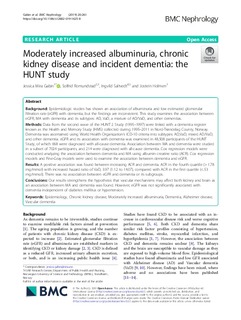Moderately increased albuminuria, chronic kidney disease and incident dementia: the HUNT study
Journal article, Peer reviewed
Published version

View/
Date
2019Metadata
Show full item recordCollections
Abstract
Background
Epidemiologic studies has shown an association of albuminuria and low estimated glomerular filtration rate (eGFR) with dementia, but the findings are inconsistent. This study examines the association between eGFR, MA with dementia and its subtypes: AD, VaD, a mixture of AD/VaD, and other dementias.
Methods
Data from the second wave of the HUNT 2 Study (1995–1997) were linked with a dementia register known as the Health and Memory Study (HMS) collected during 1995–2011 in Nord-Trøndelag County, Norway. Dementia was ascertained using World Health Organization’s ICD-10 criteria into subtypes: AD,VaD, mixed AD/VaD, and other dementia. eGFR and its association with dementia was examined in 48,508 participants of the HUNT Study, of which 668 were diagnosed with all-cause dementia. Association between MA and dementia were studied in a subset of 7024 participants, and 214 were diagnosed with all-cause dementia. Cox regression models were conducted analyzing the association between dementia and MA using albumin creatine ratio (ACR). Cox regression models and Fine-Gray models were used to examine the association between dementia and eGFR.
Results
A positive association was found between increasing ACR and dementia. ACR in the fourth quartile (> 1.78 mg/mmol) with increased hazard ratio of VaD, 3.97 (1.12 to 14.07), compared with ACR in the first quartile (<.53 mg/mmol). There was no association between eGFR and dementia or its subgroups.
Conclusions
Our results strengthens the hypothesis that vascular mechanisms may affect both kidney and brain as an association between MA and dementia was found. However, eGFR was not significantly associated with dementia independent of diabetes mellitus or hypertension.
